译林版牛津小学英语AUnitHolidays江苏张家港市
六年级上册英语Unit 6 Holidays 牛津译林版
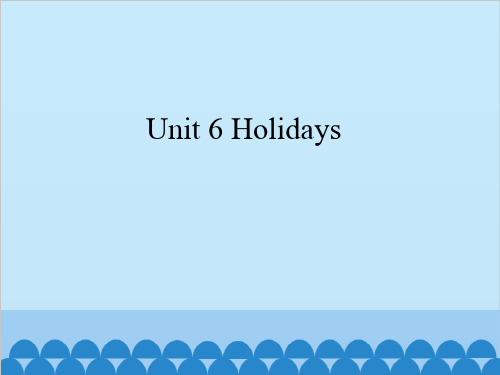
Uis it?
假日乐趣
[ˈhɒlədeɪ]假日,节日 What is your favourite holiday?你最喜爱的节日是什么?
It’s….
National Day
['næʃ(ə)nəl]
国庆节
[keɪm ]回来
The students came back to school after
What did Mike do for the National Day holiday?
Mike went to a _f_a_r_m___. He picked some o_r_a_n_g_e_s_. He went _fi_s_h_in__g_ too. He caught __a_b_i_g_f_i_sh____.
Star Lake. We picked some oranges and went fishing. Liu Tao: Did you catch any fish? Mike: Yes, I did. I caught a big fish! Liu Tao: That’s great. Why did you call me? Mike: Because I wanted to give you the fish. Liu Tao: Where’s the fish now? Mike: I ate it!
苏教牛津版英语六年级上册《Holidays》教案_六年级英语教案上册
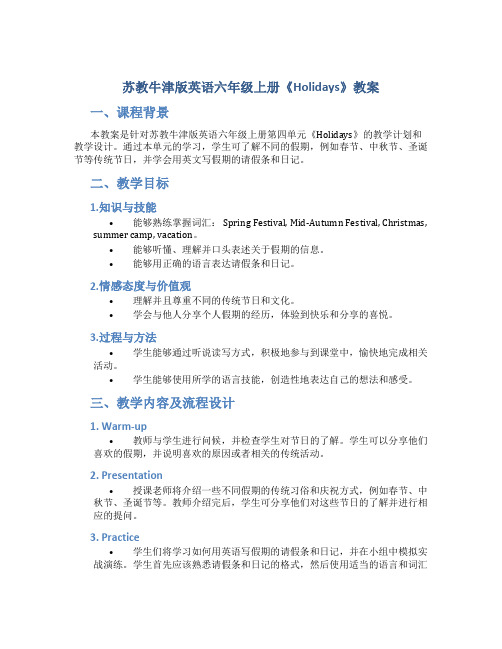
苏教牛津版英语六年级上册《Holidays》教案一、课程背景本教案是针对苏教牛津版英语六年级上册第四单元《Holidays》的教学计划和教学设计。
通过本单元的学习,学生可了解不同的假期,例如春节、中秋节、圣诞节等传统节日,并学会用英文写假期的请假条和日记。
二、教学目标1.知识与技能•能够熟练掌握词汇: Spring Festival, Mid-Autumn Festival, Christmas, summer camp, vacation。
•能够听懂、理解并口头表述关于假期的信息。
•能够用正确的语言表达请假条和日记。
2.情感态度与价值观•理解并且尊重不同的传统节日和文化。
•学会与他人分享个人假期的经历,体验到快乐和分享的喜悦。
3.过程与方法•学生能够通过听说读写方式,积极地参与到课堂中,愉快地完成相关活动。
•学生能够使用所学的语言技能,创造性地表达自己的想法和感受。
三、教学内容及流程设计1. Warm-up•教师与学生进行问候,并检查学生对节日的了解。
学生可以分享他们喜欢的假期,并说明喜欢的原因或者相关的传统活动。
2. Presentation•授课老师将介绍一些不同假期的传统习俗和庆祝方式,例如春节、中秋节、圣诞节等。
教师介绍完后,学生可分享他们对这些节日的了解并进行相应的提问。
3. Practice•学生们将学习如何用英语写假期的请假条和日记,并在小组中模拟实战演练。
学生首先应该熟悉请假条和日记的格式,然后使用适当的语言和词汇创作他们自己的请假条和日记。
学生可以在小组中表达,并互相提供反馈和建议。
4. Extension•作为扩展练习,学生可在家完成写假期日记、请假条等相关作业。
5. Sum-up•教师带领学生小结整个课程,回顾学习目标并提出相应的问题,以检查学生的掌握情况。
四、教学评估本教案旨在帮助学生发展英语听、说、读、写的能力,教师将通过以下方式对学生的学习成果进行评价:•口头表达:通过学生之间的交流,教师将检查他们的口头表达能力。
小学英语译林牛津版六年级上册《Holiday fun》教案

小学英语译林牛津版六年级上册《Holiday fun》教案【课题简介】译林版小学英语教科书六年级上册Unit3 Holiday fun第一课时story time【教材简介】本课story time主要讨论的是国庆假日,Mike和Liu Tao以对话的形式讲述他们是如何度过自己的假日,主要句型是用过去式询问和回答发生在过去的事:Where did you go?I went /visited …. What did you do ?I …. Did you ….? Yes, I did./No, I didn’t .主要词汇是一些旅游胜地和特殊动词的过去式:Bund 、Shanghai Museum ate caught came .课文内容贴近生活,鼓励学生学以致用。
【目标预设】1.知识目标1)能够掌握一些无转换规则的动词过去式以及旅游胜地的词汇:National Day holiday ,bund ,Shanghai Museum ,farm ,because, ate, caught.2)能够运用日常交际用语:Where did you go?What did you do ? Did you ….?以及它们的回答方式:I went /visited …. I …. Yes, I did./No, I didn’t .来谈论节日。
3)能够听懂,读懂和准确流利地朗读课文。
4)能够用过去式描述发生在过去的事。
2.能力目标1)能够提升学生自主学习能力。
2)能够提升学生听说读写能力。
3.情感目标1)培养学生学习英语的兴趣,树立学习英语的信心。
2)鼓励学生互相关心,互相帮助。
【重点.难点】1.学生能够通过图片,动画理解课文。
2.通过不同方式读,学生能够用准确地语音语调表演故事。
3.学生能够通过图片简单复述课文。
4.学生能够在日常生活中运用所学句型。
【设计理念】在教学中,主要采用任务型教学和情景式教学相结合。
苏教版牛津译林版小学英语六年级unit 6 holidays精品课件
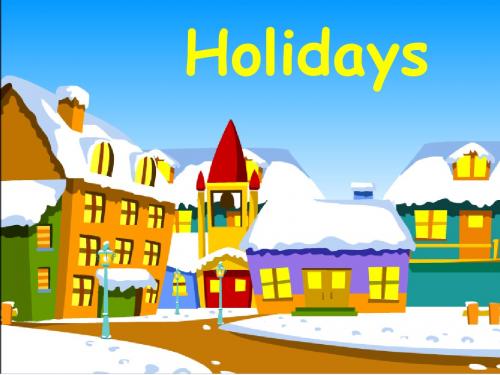
Questions: ⑴ What date is it? ⑵ What holiday is coming? ⑶ How are the teachers and the stuedents? ⑷ What are they doing?
Mid-Autumn ______ Festival
My favourite holiday There are many holidays in China/a year/…/ I know many holidays. They are … My favourite holiday is … It’s in/ on … People usually … Last year I …ed… It was …/ I like it very much./…
…
…
…
…
Models: (a)A: When’s May Day? B: It’s in/ on… A: What do you usually do on May Day? B: They usually …
(b): New Year’s Day is in/on … People usually …
is my favourite holiday. or October It’s in September _____________.People eat moon cakes, play with lanterns usually__________________ and watch the moon watched the __________.I beautiful moon last year. It was ___.
2024年江苏省苏州市张家港市小升初英语试卷(含笔试答案解析,无听力原文,无音频)

2024年江苏省苏州市张家港市小升初英语试卷一、听力(25%)1.听录音,根据所听对话内容,给下面的问题选择正确的答案。
听两遍。
(1)What country is it? (2)What did Mary have for breakfast today? (3)Where will they go first? (4)Where will Liu Tao go for the holiday? (5)What is Helen going to bring to the party? (6)What does John want to be in the future? (7)Which story does Yang Ling like best? 2.听录音,根据所听对话内容,选择下列问题的正确答案。
听两遍。
(1)What's in the fridge? A.Some milk.B.Some juice.C.Some apples.(2)What are Miss Li and her students talking about? A.Library rules.B.School rules.C.Traffic rules.(3)How will John go to Chengdu? A.By car.B.By train.C.By plane.3.听录音,根据所听短文内容,选择下列问题的正确答案。
听两遍。
(1)When does Tom often get up in the morning? A.At 6:00.B.At 6:30.C.At 6:10.(2)How long does Tom read after having breakfast? A.For 10 minutes.B.For 15 minutes.C.For 25 minutes.(3)What doesn't he do at school ? A.Listen to the teachers carefully.B.Eat or drink in class.C.Be nice to classmates.(4)What does Tom do every Sunday ? A.He flies a kite.B.He rides a bike.C.He cleans his bedroom.(5)Is Tom a good boy ? A.Yes ,he is.B.No ,he isn't.C.I don't know.4.听录音,根据所听短文内容,用数字给下列图片排序。
译林版(三起)六年级上册英语Unit6 Holidays(第一教时)教案

Unit6 Holidays一、教学内容《义务教育课程标准实验教科书·牛津小学英语》6A unit6 Holidays第一教时二、教学目标1、能正确地听、说、读、写词汇New Year’s Day, Children’s Day, people。
2、能正确地听、说、读词汇Spring Festival, Mid-Autumn Festival, May Day, National Day, Dragon Boat Festival,3、能正确地听、说、读、写句型When’s …?It’s on/in …What do people do at…?They …Did you… last …? Yes, I did. No, I didn’t.4、能运用本教时所教的内容谈论自己最喜欢的节日。
三、教学重点、难点能运用本教时所教的内容谈论自己最喜欢的节日。
四、课前准备1、课件2、练习。
五、教学过程Step 1 Warm-up1. Greetings.T: Good morning, boys and girls.Ss: Good morning, Miss Huang.T:What day is it today?Ss:It’s ........T:What date is it today ?Ss:It’s the ......T:Wish you a good day today.Ss:Thank you .2.Talk about my favourite monthT:Boys and girls ,can you guess which month does Miss Huang like ? Ss:.....T:Yes .October is my favourite month..Teach: favouriteT:Do you know why?Ss:......Ss:......T:I like it best because there are some holidays in it..What holidays do you know in it ?Ss:National Day /Halloween/T:Maybe Mid-Autumn Festival sometimes in it.OK,that’s the holidays in October.Do you know any other holidays in a year?Ss: Teachers’ Day /Children’s Day /May DayT:Which holiday do you like best ? And can you say something about the holiday?Ss:......T:You may ask him/her the questions like this.EX: When is it ?What do people usually do......?Did you ......?T:Now s ome of our friends are talking about the holidays.Let’s go into Unit6—holidays.(板书1)Step2:Presentation1、First-ReadingT:Listen to the tape ,and find how many holidays are there in this text ?What are they?1)Ss read and find .2)Ss answer the questions, and T writes down the names of the holidays on thebrlackboard.(板书2)2、Second-Reading1)T:Read out the text ,underline the key phrases about the holidays.Ss read the text2)Report their answers with complete sentencesThe way: Ask and answer (板书3)A:What do people usually do on/at.......?B:They usually ......a.T ask Ssb.Ss work in pair3、Third-Reading1)Read it together .Pay attention to the details .T: Our friends talked about the holidays .Who are they?(板书4)How did they spend their holidays?(板书5)The way:做连线P47Step3:Consolidation1)Try to repeat the passage together according to the notes on the blackboardThe way: 1) Fill in the blancks2)Group checking2)Write a short passage of your favourite holiday3)Present more western holidays to talk about if time limitsStep5:Homework1)Retall the text2)Copy the text板书设计U nit 6 HolidaysOn New Year’s Day go to parties David 头像had a big lunch with his familyAt Spring Festival visit their relatives and friends SuHai头像visit her relatives and friendseat lots of delicious foodAt Halloween dress up in custumes Ben头像went to a partygo to partiesAt Mid-Autumn Festival eat moon cakesplay with lanterns YangLin头像watched the moonwatch the moon6A Unit6 教学反思本课主要讲述中西重要节日的习俗,通过“When’s it?” “What do people usually do?” “Did you ......?”等句型来展开讨论,让学生在阅读中了解中西文化的差异,学习英语阅读的方法。
苏教牛津版英语六年级上册《Holidays》教案_六年级英语教案上册
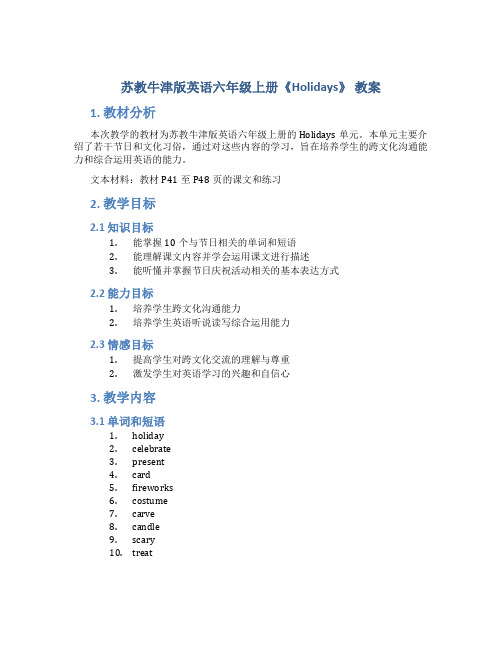
苏教牛津版英语六年级上册《Holidays》教案1. 教材分析本次教学的教材为苏教牛津版英语六年级上册的Holidays单元。
本单元主要介绍了若干节日和文化习俗,通过对这些内容的学习,旨在培养学生的跨文化沟通能力和综合运用英语的能力。
文本材料:教材P41至P48页的课文和练习2. 教学目标2.1 知识目标1.能掌握10个与节日相关的单词和短语2.能理解课文内容并学会运用课文进行描述3.能听懂并掌握节日庆祝活动相关的基本表达方式2.2 能力目标1.培养学生跨文化沟通能力2.培养学生英语听说读写综合运用能力2.3 情感目标1.提高学生对跨文化交流的理解与尊重2.激发学生对英语学习的兴趣和自信心3. 教学内容3.1 单词和短语1.holiday2.celebrate3.present4.card5.fireworks6.costume7.carve8.candle9.scary10.treat3.2 重点句型1.What do you do on Halloween?2.We carve pumpkins and wear costumes.3.Do you celebrate Christmas?4.Yes, we do. We give presents and send cards to friends.5.How do you celebrate Chinese New Year?6.We decorate the house with red paper and have a big family dinnerwith dumplings.7.What do you do on New Year’s Eve?8.We watch fireworks and count down the seconds until midnight.3.3 课堂活动1.看图片猜节日:用图片和名词卡片让学生猜测这是哪个节日。
苏教版牛津译林版小学英语六年级上册Unit 3 Holiday funword教案2

Unit 3 Holiday fun一、教学目标认知目标1.能正确理解、掌握A部分对话,并能朗读和表演对话。
2.能正确地运用对话中出现的日常交际用语,where did you go for the holiday? I went to…what did you do…? Did you …? Yes, I did. No, I didn’t…3.掌握会话中出现的单词holiday, National Day, call, Bund, Star Lake, Shanghai Museum, gofishing.能力目标1.能正确理解,掌握A部分会话,并能熟练的朗读和表演会话。
情感目标1.让学生感到用英语开启话轮询问和交流未来的计划打算很有意义。
2.让学生快乐学英语,从英语学习中体会到成功。
教学重难点及突破重点1.能听懂,会说,会读和会拼写holiday, National Day, call, go fishing.2.能听懂,会说,会读和会写句型what did you do…? Did you …? Yes, I did. No, I didn’t…3.难点能正确理解和掌握A部分会话,并能熟练朗读和表演会话。
教学突破充分利用文本进行阅读训练,主要设计思路是通过听的方式来获取信息,要求学生先听懂对话的大意,然后要求学生进一步听懂对话的进一步细节,最后把听的内容,通过自己做的笔记来用自己的语言复述出来,在此过程中,要用自己的思维组织语言,这是第一步,解决对话说了什么,对话传递了什么样的信息。
第二步,是对话是怎么说的。
文本中用了哪些问句来开启和延续话题的,这些问句的前后逻辑关系又是什么。
让学生先通过听读,找到对话的主干语言,基本上是那些问句。
然后再设计QQ聊天的方式,尝试用这些主干语言来转述从这些对话文本中所学到的信息,学会表达。
最后,理清这些主干语言的逻辑关系,进行自主的连贯性表达。
让学生学会学习,其实最好的教学应该是学生学会了学,而不是在意教了他多少。
译林版牛津6A Unit 6 Holidays教案
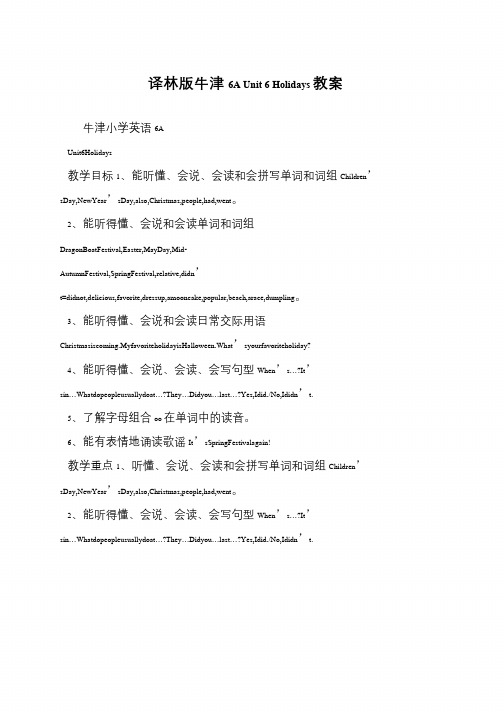
译林版牛津6A Unit 6 Holidays 教案
牛津小学英语6A
Unit6Holidays
教学目标1、能听懂、会说、会读和会拼写单词和词组Children’
sDay,NewYear’sDay,also,Christmas,people,had,went。
2、能听得懂、会说和会读单词和词组
DragonBoatFestival,Easter,MayDay,Mid-
AutumnFestival,SpringFestival,relative,didn’
t=didnot,delicious,favorite,dressup,amooncake,popular,beach,arace,dumpling。
3、能听得懂、会说和会读日常交际用语
Christmasiscoming.MyfavoriteholidayisHalloween.What’syourfavoriteholiday?
4、能听得懂、会说、会读、会写句型When’s…?It’sin…Whatdopeopleusuallydoat…?They…Didyou…last…?Yes,Idid./No,Ididn’t.
5、了解字母组合oo 在单词中的读音。
6、能有表情地诵读歌谣It’sSpringFestivalagain!
教学重点1、听懂、会说、会读和会拼写单词和词组Children’
sDay,NewYear’sDay,also,Christmas,people,had,went。
2、能听得懂、会说、会读、会写句型When’s…?It’sin…Whatdopeopleusuallydoat…?They…Didyou…last…?Yes,Idid./No,Ididn’t.。
译林版牛津小学英语AUnitHolidays江苏张家港市
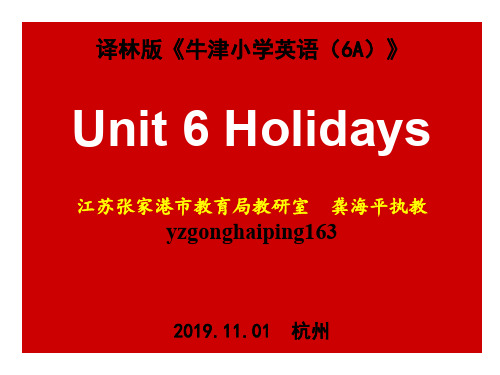
Su Hai: Of course, I did.
Ben: My favourite holiday is Halloween.
Su Hai: When’s Halloween?
Yang Ling: Mid-Autumn Festival. It’s in September or October. We usually eat moon cakes, play with lantern and watch the moon.
Mr Green: Did you watch the moon last MidAutumn Festival?
Ben: It’s in October. People usually dress up in customs and go to parties. I went to a party last Halloween. It was fun.
Mr Green: Yang Ling, what’s your favourite holiday?
holidays. Mr Green is telling his students about holidays. 3. My favourite holiday is Halloween. I like Halloween best . 4. The moon is beautiful. The moon is nice .
5. May 1st is
.
While-reading(1) Read the text and judge “√” or “×”. 1. Today is December 18th. ( ) 2. Mrs Green is talking about holidays. ( ) 3. David didn’t go to a party last Spring Festival.
牛津小学英语holidays课件
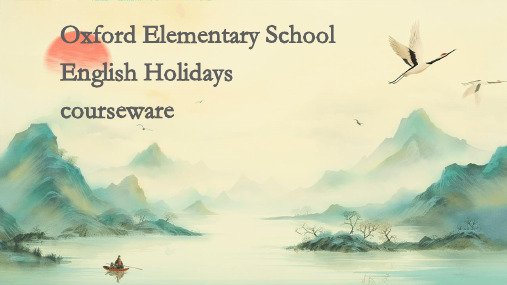
要点二
Modern festivals
These are the relatively new festivals that have emerged in recent years, such as Valentine's Day, Mothers' Day, and Earth Day These festivals are commonly associated with a specific theme or cause and are cellular through various activities and events
Identify the subject and predict in each sense
Explain the function of positions, connections, and articles in constructing sentences
Focus on the differences between simple, complex, and complex senses
01
Storytelling
Applying vocabulary through story context, such as telling
stories related to festivals, using newly learned vocabulary to
express oneself.
02
Role play
Simulating real-life situations through role-playing, such as
Christmas parties, Easter egg hunting games, or Halloween
牛津译林版六年级英语上册Unit 3 Holiday fun 课件 1
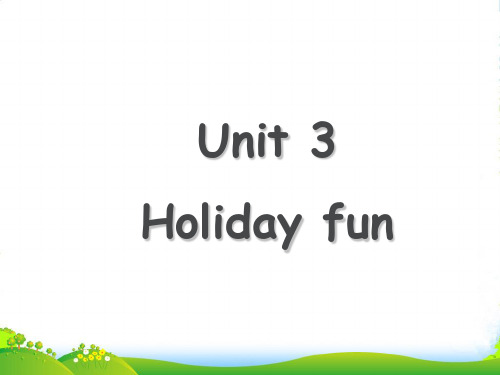
You made my day!
我们,还在路上……
Why didn’t he get the fish?
Because Mike ate it.
eat
ate
Understanding.
(理解本节课上小结的一般过去时的知识,记住涉及的动词过去式形式)
Read the dialogue , try to recite it.
Make a introduction.
Unit 3 Holiday fun
Guess: What festival is it ?(这是什么节日?)
National Day
国庆节
Did you go to school on National Day? No, we didn’t. Why(为什么)? Because it’s a holiday(假期).
MuDseidumhe
chaistcauhntany
fish?
He saw many
interestincgatch
things.
a farm near Star Lake
He picked some
owreacnnatgfueissghhainntgd.
Shanghai Bund Shanghai Museum
Where did Liu Tao and Mike go for the holiday ?
Where did Liu Tao and Mike go for the holiday ?
Liu Tao went to Shanghai. Mike went to a farm.
the Bund and the Shanghai
牛津苏教六上UnitHolidays课件之四

Festival
Festival
Festival
New Year’s Day
Spring Easter Mid-Autumn DragonBoat
Festival
Festival
Festival
ew Year’s DayMay Day
Spring Easter Mid-Autumn DragonBoat
Day
Day
Spring Easter Mid-Autumn DragonBoat
Festival
Festival
Festival
New Year’s May Day National Halloween
Day
Day
Children’s Day
Spring Easter Mid-Autumn DragonBoat
Festival
Festival
Festival
New Year’s May Day National
Day
Day
Spring Easter Mid-Autumn DragonBoat
Festival
Festival
Festival
New Year’s May Day National Halloween
New Year’s May Day National Halloween
Day
Day
Children’s Day
Christmas
Teachers’ Day
Spring Easter Mid-Autumn DragonBoat
Festival
Festival
Festival
New Year’s Day
江苏译林牛津小学英语全部单词表之欧阳德创编
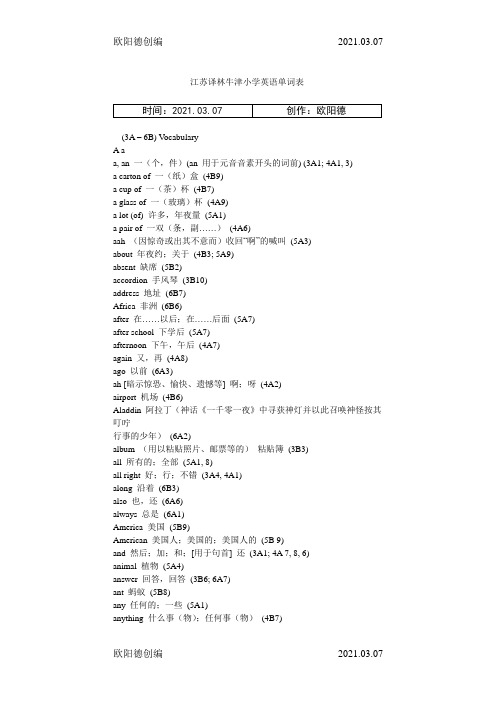
江苏译林牛津小学英语单词表(3A – 6B) V ocabularyA aa, an 一(个,件)(an 用于元音音素开头的词前) (3A1; 4A1, 3)a carton of 一(纸)盒(4B9)a cup of 一(茶)杯(4B7)a glass of 一(玻璃)杯(4A9)a lot (of) 许多,年夜量(5A1)a pair of 一双(条,副……)(4A6)aah (因惊奇或出其不意而)收回“啊”的喊叫(5A3)about 年夜约;关于(4B3; 5A9)absent 缺席(5B2)accordion 手风琴(3B10)address 地址(6B7)Africa 非洲(6B6)after 在……以后;在……后面(5A7)after school 下学后(5A7)afternoon 下午,午后(4A7)again 又,再(4A8)ago 以前(6A3)ah [暗示惊恐、愉快、遗憾等] 啊;呀(4A2)airport 机场(4B6)Aladdin 阿拉丁(神话《一千零一夜》中寻获神灯并以此召唤神怪按其叮咛行事的少年)(6A2)album (用以粘贴照片、邮票等的)粘贴簿(3B3)all 所有的;全部(5A1, 8)all right 好;行;不错(3A4, 4A1)along 沿着(6B3)also 也,还(6A6)always 总是(6A1)America 美国(5B9)American 美国人;美国的;美国人的(5B 9)and 然后;加;和;[用于句首] 还(3A1; 4A 7, 8, 6)animal 植物(5A4)answer 回答,回答(3B6; 6A7)ant 蚂蚁(5B8)any 任何的;一些(5A1)anything 什么事(物);任何事(物)(4B7)Anything else? 还要另外工具吗?(4B7) apple 苹果(3A3; 4B4)April 四月(6A2)arm 手臂(5B6)art 艺术;美术(5A9)as 作为,当作(6A2)as … as 和……一样(6B1)ask 问(6A1)at 在(4A7)at home 在家(5A6)at once 立刻, 马上(5B1)at school 在学校;在上课(5A1)at the back of 在……后部;在……后面(6A7) August 八月(6A2)aunt 伯母;舅母;婶;姑;姨(3B3; 5B3) Australia 澳年夜利亚(5B9)Australian 澳年夜利亚人(5B9)autumn 秋季(6A5)away (离)开(6A1)B bback 回(原处)(5A1)backache 背痛(5B2)bad 坏的;严重的(3A5; 5B2)bag 包;袋(3B1)ball 球(4B6)ball game 球类运动(3B10)ball pen 圆珠笔(3A5; 4A1)balloon 气球(4A4)banana 香蕉(3A3; 4B4)bar 块;条(3B8)baseball 棒球运动;棒球(3B10)basket 篮;筐(3A9)basketball 篮球运动;篮球(3B10; 4B7) bathroom 浴室,盥洗室(3B7; 5A2)be 是;成为;酿成(4A8; 4B3)am (3A11)are (3A5; 4A1)aren’t = are not (4B3)is (3A2;4A1)isn’t = is not (4A2)be good at 善于(6B2)be late for 迟到(4B2)beach 海滩(6A6)bear 熊(4A2)beautiful 美丽的,漂亮的(5B3)beautifully 美地(5B4)because 因为(4B1; 6B5)bed 床(3A4; 3B7)bedroom 卧室,寝室(3B7 ;5A2)bee 蜜蜂(5B 8)before 在……以前(3B5; 6A5)begin 开始(5B7)behind 在……后面(5A2)Beijing Opera 京剧(6B6)belt 皮带(3B9)beside 在……旁边;靠近(6A7)better 好些(5B2)big 年夜的(3A11; 4A6)bike 自行车(3A8; 3B5)bird 鸟(3A1; 6A1)birthday 生日(6A2)biscuit 饼干(4B7)black 黑色的(3A2)blackboard 黑板(4B8)blanket 毛毯,毯子(5A8)blouse (女式)衬衫(3A7)blow 吹(6A2)blow out 吹灭(6A2)blue 蓝色的;蓝色(3A2; 4A2)book 书(3A5; 3B1)bookcase 书架;书橱(3A4; 4B8)bookmark 书签(4A1)bookshop 书店(6B3)both 两个(都)(6B7)bottle (盛液体的)狭颈小口瓶(4B9; 4A3)bowl 碗(4B9)box 盒子;箱子(3A9; 4B8; 4A2)boy 男孩(3A11; 3B3)boys and girls 孩子们(4A8) bread 面包(3B8; 4B9) breakfast 早餐(4A7)bright 明亮的(3A8; 4B8)British 英国人(5B9)broom 扫帚(3B7)brother 兄;弟(3A3; 4B2)brown 褐色的,棕色的;褐色,棕色(3A2; 4A4)brush 刷(5B7)building 年夜楼;建筑物(5A1)bus 公共汽车(3A8; 3B5)busy 忙(碌)的(5B4)but 可是(3A8; 4A3)butterfly 蝴蝶(5B8)buy 买(4B4)by [暗示交通等的方法] 乘(3A8; 4A7; 4B6)by the way 顺便地;附带说说(6B6)bye [ 多用于熟人之间] 再见,再会(3A5;4A7)C ccage 笼子(6A1)cake 蛋糕;糕;饼(3A10; 3B8)calculator 计算器(6A7)call 通话;(一次)德律风;打德律风(给)(5B2)camera 照相机(3B2; 6A3)camp 野营;营地(6A5)camping site 野营营地(5A8)camping trip 野营旅行(5A8)can 能;可以(4A2)Can I help you? 我能为你效劳吗?(办事员等经常使用的招呼语)(3A3; 4B4)can’t = cannot 不克不及;不成以(4A2)candle 蜡烛(6A2)cannot = can’t (5B4)cap 便帽(3B9)car 汽车;小汽车(3A8; 3B5)card 贺卡;卡片;纸牌(4A1; 5A7)carefully 小心地,仔细地(5B4)carrot 胡萝卜(6A5)carry 搬,运,带(5B8)carton (纸)盒(3B8)cartoon 动画片,卡通(5B8)cat 猫(3A1; 4A2)catch 捉住;抓住(5B8)CD Walkman 光盘随身听(一种带耳机的多功能光盘播放机)(6A3) centimeter 厘米(6B1)chair 椅子(3A4; 3B7)change 找头;零钱(5A4)chess 棋(5A7)chick 小鸡(3B4)chicken 小鸡,鸡;鸡肉(5A4)child 孩子,儿童(6B1)children [单数]孩子们,儿童(5A8)Children’s Day 儿童节(6A6)China 中国(4B8)Chinese 中国的;汉语,中文;中国人(3A11; 5B1) chocolate 巧克力(4B7)choose 选择(5B2)chopsticks [单数] 筷子(4B9)Christmas Day 圣诞日,圣诞节(6A7)Christmas 圣诞节(6A6)cinema 片子院(3A8; 4A7)circle 圆;圆圈(5A9)city 城市;城市的(5B9; 6B3)class 课(4A8)classmate 同班同学(5B3)classroom 教室(4A3)clean 把……弄干净;擦干净(4A4)climb 攀登;攀爬(4B1)clock 钟(3B2)close 关,闭(3A9; 4A8)clothes [单数]衣服(5A6)club 俱乐部(5B9)coat 外套;上衣(3A7)coffee 咖啡(3A10; 4B7)cold 冷的(4A9)collect 收集(5B3)colour 给……着色;颜色(4A4)comb 梳子(6A7)come 来(3B1; 4B9; 4A1)come down 下来(4B1)come here 来这里(4A3)come home 回家(4A7)come in 进来(3B2; 4A1)come up 上来(6A1)computer 计算机(俗称电脑)(3B2; 4B8) computer room 计算机房(4A3)computer studies 计算机课程(5B1)concert 音乐会(6B6)contest 竞赛,角逐(6B6)cook 伙食员;厨师;烹调,做饭(3B8; 4B3; 5A4) cool 凉的,凉快的(6B5)cooker 炊具(锅,电饭锅,烤炉)(3B8)copy 缮写(4A8)copybook 缮写本(3B1; 4A1)costume 全套衣饰;戏装(6A2)cough 咳嗽(5B2)country 国家(5B9)countryside 农村地区,乡下(6B5)cousin 堂(表)兄弟;堂(表)姐妹(6A1)cover 封面(3B3)cow 母牛,奶牛(6A5)crayon 蜡笔(3B1; 4A3)crossing 十字路口(6B3)cry 哭;喊叫(5A7)cup 杯子(4B7, 9)cupboard 碗橱;(放食品等的)小橱(4B9)cute 漂亮的;娇小可爱的(6B1)D dDad <口语> 爸爸,爹爹(3A4; 4A4)dance 跳舞(5A3)danger 危险(6A1)date 日期(6A2)daughter 女儿(3B3)day (一)天;白日(3A2; 5A1)dear 亲爱的(4B7)December 十仲春(6A2)delicious 美味的,可口的(6A6)desk 书桌(3A4; 3B7)diamond 菱形;菱形的(5A9)diary 日记;日记簿(6A3)did (do的过去式) (6A5)didn’t = did not (6A6)different 不合的(5B9)diningroom 餐厅(3B7; 5A2)dinner 正餐;主餐(通常是晚餐)(4B9)do [构成否定句及疑问句的助动词,无词义];做,干(3B1; 4A4, 8) doctor 医生(4B1)dog 狗(3A1; 4A2)doll 玩具娃娃(4A4)don’t = do not (4A4)Don’t worry. 别担心。
小学英语: Unit 6【Holidays】11课件 (苏教牛津版六年级上)
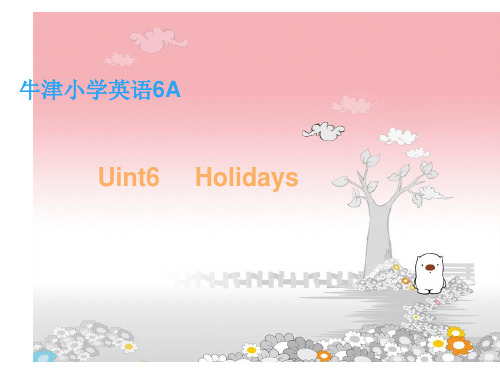
What do people usually do at…? They usually… Did you … last …?
Yes, I did. / No, I didn’t.
Listen to the tape and answer the questions
It is in May or June. There are dragon boat races. People usually go to watch them. Many people eat rice dumplings.
It is in September or October. In the evening, people usually watch the moon. They also eat moon cakes. Cnterns.
1.What holiday comes after Christmas(圣诞节)? 2.What do people usually do on New Year’s Day?
3.Do people usually visit their relatives(亲戚) and friends at the Spring Festival?
It is on the 1st of May. People usually have a long holiday. They meet friends and relatives. They go to parks and beaches.
It is the 1st of June. Children usually have parties at school.
牛津小学英语6A
六年级上册英语教案Unit 6 Holidays(A)牛津译林(一起)
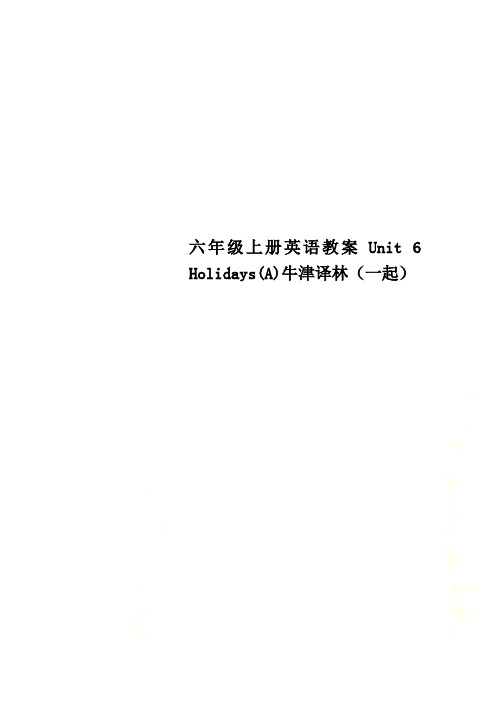
六年级上册英语教案Unit 6 Holidays(A)牛津译林(一起)分对话内容,并能用自己的话复述节日。
四、课前准备:多媒体课件。
五、教学过程:Step1.Free talk1.What day/date is /was it today/yesterday?2.Chant together:Trick or treat!Step2.Pre-reading1.What do people usually do at Halloween? They…play trick or treatgo to partiesmake pumpkin lanternsdress up in costumes Did you …yesterday? Yes,I did. /No, I didn’t.Were you happy?2.Now,boys and girls.Do you like Halloween?But I don’t like Halloween.I like Christmas best.It’s my favourite holiday.Learn: favouriteMy favourite holiday is Christmas .I like Christmas best(最).When? on the 25th of DecemberWhat holiday comes after Christmas?3. When’s New Year’s Day? It’s in January.What do people usually do on New Year’s Day? They…have a big lunchgo to partiesDid you …last…?Yes,I did. /No, I didn’t.Work in pairs: When’s…? It’s in…What do people usually do at/on…? They…Did you …last…?Yes,I did. /No, I didn’t.4.Boys and girs,do you like Spring Festival?Good. At Spring Festival,we can do lots of exciting things.Because it’s our Chinese traditional festival.Look!This is another traditional festival.Learn: Mid-Autumn FestivalWhen is Mid-Autumn Festival?What do people usually do at Mid-Autumn Festival? They usually …eat moon cakeswatch the moonplay with lanterns Did you …las t Mid-Autumn Festival ?Step3.While-reading1.Just now,we talked about some holidays.Look, Mr Green is talking to his students about holidays.Do some tasks:①Listen and circle.②Listen and judge.③Read and choose.2.Read after the tape.Step4.After-reading1.Look and say:How did they spend their holidays last year?2.Talk about your favourite holiday.Step5.Homework1.Follow the tape,read Part A and try to retell it.2.Talk about your favourite holiday with your partner.板书设计:Unit 6 HolidaysNew Year’s Day have a big lunch go to parties David had a …. Spring Festival visit their relatives and friends Su Hai visited her ….eat lots of delicious foodHalloween dress up in costumes go to parties Ben went to …. Mid-Autumn Festival eat moon cakes watch the moon Yang Lingwatched….play with lanterns教学反思:本单元围绕“谈论节日里所做的事”这一话题展开教学活动。
六年级上英语ppt课件unit6Holidays牛津译林一起2
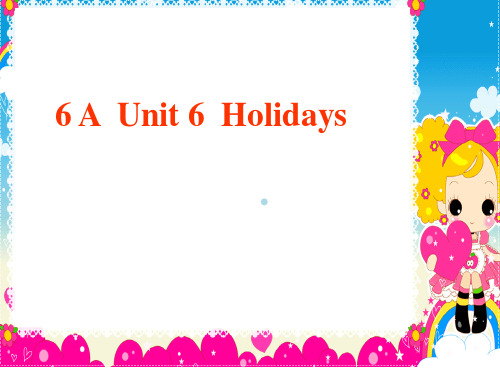
常见心律失常心电图诊断的误区诺如 病毒感 染的防 控知识 介绍责 任那些 事浅谈 用人单 位承担 的社会 保险法 律责任 和案例 分析现 代农业 示范工 程设施 红地球 葡萄栽 培培训 材料
What do people usually do at Mid-Autumn Festival? 常见心律失常心电图诊断的误区诺如病毒感染的防控知识介绍责任那些事浅谈用人单位承担的社会保险法律责任和案例分析现代农业示范工程设施红地球葡萄栽培培训材料 They often eat moon cakes./
May Day
What do people usually do at……? They often……
常见心律失常心电图诊断的误区诺如 病毒感 染的防 控知识 介绍责 任那些 事浅谈 用人单 位承担 的社会 保险法 律责任 和案例 分析现 代农业 示范工 程设施 红地球 葡萄栽 培培训 材料
Guess. What holiday is it?
the
Children’s 常见心律失常心电图诊断的误区诺如病毒感染的防控知识介绍责任那些事浅谈用人单位承担的社会保险法律责任和案例分析现代农业示范工程设施红地球葡萄栽培培训材料
Day
What do children usually do at……? They often……
常见心律失常心电图诊断的误区诺如 病毒感 染的防 控知识 介绍责 任那些 事浅谈 用人单 位承担 的社会 保险法 律责任 和案例 分析现 代农业 示范工 程设施 红地球 葡萄栽 培培训 材料
1、课后向家长、朋友用本课操练的句 型询问他们最喜欢的节日,并完成表 格。
- 1、下载文档前请自行甄别文档内容的完整性,平台不提供额外的编辑、内容补充、找答案等附加服务。
- 2、"仅部分预览"的文档,不可在线预览部分如存在完整性等问题,可反馈申请退款(可完整预览的文档不适用该条件!)。
- 3、如文档侵犯您的权益,请联系客服反馈,我们会尽快为您处理(人工客服工作时间:9:00-18:30)。
Mr Green: Did you watch the moon last MidAutumn Festival?
() 4. People usually dress up in customs Mid-Autumn
Festival. ( ) 5. Yang Ling’s favourite holiday is Halloween. ( )
It is the 18th of December. Christmas is coming. The teachers and the students are very excited. Today, Mr Green is talking to his students about holidays. Mr Green: Christmas is on the 25th of December.
What holiday comes after Christmas? Su Hai: New Year’s Day and Spring Festival. Mr Green: What do people usually do on New
Year’s Day? David: They go to parties. I didn’t go to a party
Yang Ling: Yes, I did. It was beautiful.
While-reading(2) Answer the following questions. 1. What’s the date today? 2. When’s Christmas Day? 3. What do people usually do on New Year’s Day? 4. What do people usually do at Spring Festival? 5. What do people usually do on Halloween? 6. What do people usually do on Mid-Autumn
eat moon cakes. It’s M id-Autumn Festival.
Post-reading(3)
Choose the right answers.
1.
are Chinese holidays.
A. Christmas
B. Mid-Autumn FFra bibliotekstivalC. Spring Festival D. Halloween
Ben: It’s in October. People usually dress up in customs and go to parties. I went to a party last Halloween. It was fun.
Mr Green: Yang Ling, what’s your favourite holiday?
get very excited . 2. Father’s brothers and sisters, and Mother’s
brothers and sisters are our r elatives . 3. On the day, we usually watch the moon and
last year. I had a big lunch with my family.
Mr Green: Su Hai, What do people usually do at Spring Festival?
Su Hai: They visit their relatives and friends, and eat lots of delicious food.
5. May 1st is
.
While-reading(1) Read the text and judge “√” or “×”. 1. Today is December 18th. ( ) 2. Mrs Green is talking about holidays. ( ) 3. David didn’t go to a party last Spring Festival.
(√ ) 4. People usually dress up in customs Mid-Autumn
Festival. (× ) 5. Yang Ling’s favourite holiday is Halloween. ( × )
It is the 18th of December. Christmas is coming. The teachers and the students are very excited. Today, Mr Green is talking to his students about holidays. Mr Green: Christmas is on the 25th of December.
last year. I had a big lunch with my family.
Mr Green: Su Hai, What do people usually do at Spring Festival?
Su Hai: They visit their relatives and friends, and eat lots of delicious food.
Yang Ling: Mid-Autumn Festival. It’s in September or October. We usually eat moon cakes, play with lantern and watch the moon.
Mr Green: Did you watch the moon last MidAutumn Festival?
What holiday comes after Christmas? Su Hai: New Year’s Day and Spring Festival. Mr Green: What do people usually do on New
Year’s Day? David: They go to parties. I didn’t go to a party
Festival?
Post-reading(1) Answer the following questions. 1. Why are the students very excited? 2. What did you do on the evening of 19th this
month?
Post-reading(2) Complete the following sentences. 1. When holidays are coming, children usually
Pre-reading(2)
Fill in the blanks.
1. Children’s Day is on June
.
2. September 10th is
Day.
3. Mid-Autumn Festival of 2019 is on
.
4.
Day of China is on October 1st.
Yang Ling: Yes, I did. It was beautiful.
While-reading(1) Read the text and judge “√” or “×”. 1. Today is December 18th. ( √ ) 2. Mrs Green is talking about holidays. ( √ ) 3. David didn’t go to a party last Spring Festival.
holidays. Mr Green is telling his students about holidays. 3. My favourite holiday is Halloween. I like Halloween best . 4. The moon is beautiful. The moon is nice .
向工作在小学英语 教学第一线的老师们致 敬!
欢迎批评指正!
E. New Year’s Day F. May Day
Post-reading(4) Say in another way. 1. I had a big lunch with my family.
I ate lots of delicious food with my family. 2. Mr Green is talking to his students about
Mike: Did you visit your relatives and friends last Spring Festival?
Su Hai: Of course, I did.
Ben: My favourite holiday is Halloween.
Su Hai: When’s Halloween?
Ben: It’s in October. People usually dress up in customs and go to parties. I went to a party last Halloween. It was fun.
Mr Green: Yang Ling, what’s your favourite holiday?
译林版《牛津小学英语(6A)》
